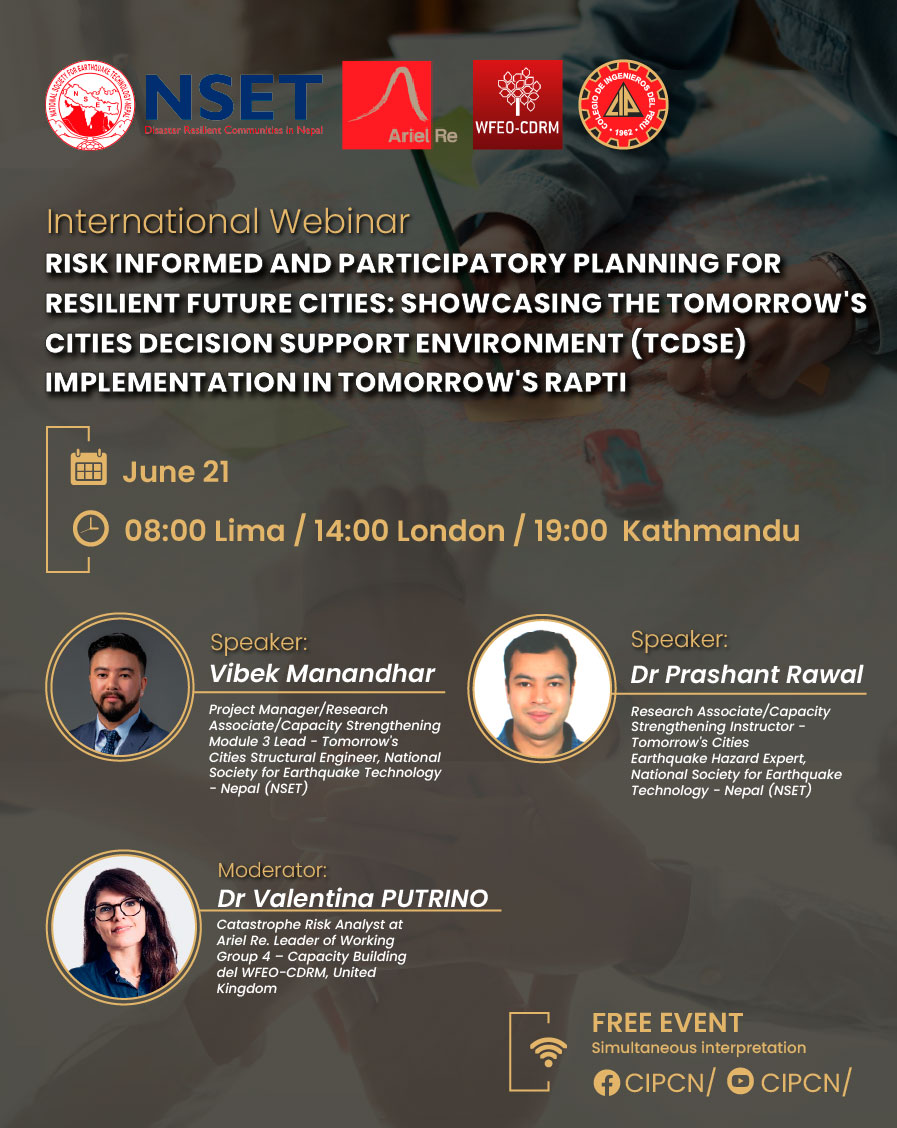INTERNATIONAL WEBINAR
RISK INFORMED AND PARTICIPATORY PLANNING FOR RESILIENT FUTURE CITIES: SHOWCASING THE TOMORROW’S CITIES DECISION SUPPORT ENVIRONMENT (TCDSE) IMPLEMENTATION IN TOMORROW’S RAPTI
The Technical Committee on Disaster Risk Management of the World Federation of Engineering Organizations (WFEO) and the Peruvian Engineers Association (CIP) are organizing this important event to be held on June 21, at 08:00 hrs. in Lima, 14:00 hours in London and 19:00 hrs. in Kathmandú.
The presentation will focus on the risk-informed and participatory urban planning framework designed to create resilient cities of Tomorrow, the Tomorrow’s Cities Decision Support Environment (TCDSE). Exhibiting the implementation of the TCDSE at Rapti, the capital city of Lumbini Province, Nepal, it will demonstrate how integrating multi-hazard risk assessments, climate change projections, and community engagement can lead to adaptive and sustainable urban development.
PROGRAMME
OUR SPEAKERS
 |
Vibek Manandhar is a structural engineer, multi hazard DRR professional and currently the Project Manager for Tomorrow’s Cities, with over a decade of experience in infrastructure planning/design and multi hazard disaster risk reduction (DRR) initiatives. He is a Chevening Scholar and holds a Master’s degree in Civil Engineering (with Seismic Design) from University College London, UK and a Master’s degree in Civil Engineering (Construction Management) from Institute of Engineering (Tribhuvan University, Nepal). He has led multiple pioneering projects in Nepal, demonstrating his technical expertise and innovative approaches in engineering and risk assessment projects.
In his role as Project Manager for Tomorrow’s Cities at the National Society for Earthquake Technology-Nepal (NSET), Vibek has been at the forefront of integrating climate change resilience and disaster risk reduction into urban development of future cities. His work includes developing risk informed urban master plans through participatory and inclusive processes, conducting multi-hazard physical and social impact assessments, while collaborating with government institutions, private sector partners, and international stakeholders in Europe, Africa, South America and South Asia. As module lead, he headed the development of a dedicated module for multi hazard physical infrastructure impact assessment for technical capacity strengthening across various stakeholder groups. Vibek’s extensive fieldwork with indigenous communities underscores his commitment to inclusive and sustainable development. His technical expertise and hands-on experience in community engagement and policy advocacy contribute to advancing safer, more resilient infrastructure. |
 |
Prashant Rawal is a structural engineer specializing in seismic hazard research and currently a member of the National Society for Earthquake Technology (NSET) – Nepal. Prashant holds a Master’s degree in Structural Engineering and a Ph.D. in Civil Engineering from Clemson University, USA.Prashant’s work at NSET seismic hazard research, including the deployment of sensors for seismic monitoring and the development of earthquake early warning systems. His recent contributions to the Tomorrow’s Cities initiative involved exposure modelling, generating future exposure data for Rapti, along with other cities of Dar Es Salaam, Chattogram, and Bazaar. In addition to his technical research, Prashant has contributed in curriculum development and training for exposure data generation and seismic hazard analysis as part of the Tomorrow Cities capacity development module. |
OUR MODERATOR
 |
Valentina Putrino is currently a Catastrophe Risk Analyst at Ariel Re. She obtained her PhD from University College London (UCL), focusing on developing a framework for multi-hazard assessment of historic stonework structures. She currently holds the position of Chair of the EEFIT Committee, she is the SECED Representative for the World Federation of Engineering Organizations (WFEO) – Committee on Disaster Risk Management (CDRM), and is also the designated liaison member between both SECED and EEFIT committees. |


